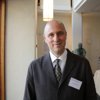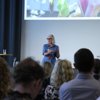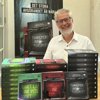Fritextsökning
Artiklar per år
Innehållstyper
-

This years Nobel prize in medicine – “Changed the understanding of how genes are controlled”
This year’s Nobel Prize in Physiology or Medicine goes to the discovery that small RNA molecules, known as microRNAs, control how genes are regulated. Understanding the mechanism has changed our view of human biology and evolution, says KI Professor András Simon.
-

From lab to patient – the art of developing new antibody therapies
For 25 years, Danish company Genmab has been developing antibodies and has managed to get several drugs all the way to the patient. Esther Breij has been along for much of the journey and has experienced setbacks, but also huge discoveries. “It’s amazing when you succeed,” she says.
-

Anna Törner: ”Mom, do you think you’ll ever get married again?”
”I realize I’m slowly descending into that familiar statistical rabbit hole, where life’s biggest uncertainties are reduced to point estimates and confidence intervals”, Anna Törner writes in a column.
-

Artificial intelligence in radiology – “Risk prediction is very exciting”
A growing number of solutions based on artificial intelligence are being developed and used in healthcare. According to Sophia Zackrisson, Professor of Radiology at Lund University, radiology is a field that is well suited to the technology.
-

Biotech-entreprenör och sci-fi-författare – ”För att koppla av började jag skriva”
Han har grundat Lundabolaget Iconovo, författat en trilogi sci-fi-deckare och drömmer om en Netflix-serie baserad på hans egna böcker. ”Det roligaste är att ta en idé och realisera den” säger Orest Lastow.
-

Gothenburg, the city of life science – We are ‘Little Boston’
Western Sweden is investing in life science within everything from advanced therapeutic drugs to femtech. At the same time, stakeholders are looking to other industries for inspiration and knowledge.
-

Danish obesity success causes recruitment problems in southern Sweden
The substantial expansion of Danish Novo Nordisk is affecting companies in southern Sweden, which are finding it increasingly difficult to compete for attractive staff.
-

EMA review confirms a risk of new cancer after CAR-T
CAR-T cancer therapies can, in rare cases, induce secondary cancers. The European Medicines Agency (EMA) now recognises this and requires a warning label to be attached to the product information and patients to be followed up for life.
-

Nobel Prize winner Torsten Wiesel turns 100: “Old men like me should use their experience to help the young”
In 1955, a young Torsten Wiesel jumped on a boat to the US and embarked on a fabulous career as a neuroscientist, crowned with a Nobel Prize for his work. Now 100 years old, he looks back on an intense life and his upbringing in Stockholm, Sweden, which shaped his desire to help the vulnerable in society.
-

Innovative start-up helps doctors, scientists and industry balance coagulation risks
For many doctors caring for seriously ill patients, for example, in stroke units and cancer wards, maintaining the life-saving balance between bleeding and thrombosis is an ongoing challenge. In the late 1980s, scientists at Maastricht University in the Netherlands developed an innovative method, the thrombin generation assay (TGA), which provides a complete overview of a physiological process crucial for maintaining normal haemostasis.
-

“Conducting research at universities is becoming more and more like working at a research hotel”
The government wants Swedish research to focus on excellence and innovation, but can the two be combined? Life Science Sweden talks to Anna Falk, a professor at Lund University, about research policy, the constant hunt for funding in academia and what constitutes ‘fine research’.
-

Ny finansiering ska ta Linköpingsbolagets sensorsystem vidare
Linköpingsbolaget Argus Eye, som utvecklar sensorsystem för biologiska läkemedel, har tagit in 32,5 miljoner kronor i en finansieringsrunda.
-

Carl Borrebaeck – professor and serial entrepreneur with a taste for speed
Award-winning cancer researcher, the founder of many listed companies, and constantly in the academic and commercial spotlight for decades. However, Carl Borrebaeck, Professor of Immunotechnology at Lund, is not yet satisfied. “We have a new, potentially super exciting project in the pipeline,” he says.
-

Carl Borrebaeck – professor och serieentreprenör med känsla för fart
Prisbelönt cancerforskare, grundare av en hel drös börsbolag, ständigt i den akademiska och kommersiella hetluften under flera decennier. Men Carl Borrebaeck, professor i immunteknologi i Lund, är inte nöjd än. ”Vi har ett nytt, potentiellt superspännande projekt på gång”, säger han.
-

Ancient DNA provides new insights – “The immune system lost its job”
Ancient bone remains from our ancestors have provided new insights into the prevalence of multiple sclerosis. By looking back in time, researchers can provide a possible explanation for why the disease is more prevalent in northern Europe.
-

KI’s freezer fiasco investigated: A chain of failures
A chain of combined technical and organisational shortcomings caused the freezer breakdown at the Karolinska Institute during the Christmas holidays, destroying more than 47,000 samples. This was the conclusion of an internal investigation.
-

Så ska skånsk biotech locka investerare
Bolag inom skånsk life science attraherar mindre pengar än snittet i Sverige enligt en ny rapport. Något Petter Hartman, vd för Medicon Village Innovation, menar har flera orsaker.
-

Nocebo – the evil twin that makes you feel worse
The placebo effect is well known in healthcare, but not so its opposite: nocebo. “The effect is small, but it can have major repercussions,” says Uppsala researcher Charlotte Blease, co-author of a book on the phenomenon.
-

Study: Popular diabetes treatment is not associated with thyroid cancer
Concerns raised about an association between GLP-1 analogues, used to treat diabetes and obesity, and an increased risk of thyroid cancer are not supported by an extensive Scandinavian study.
-

Beta-blockers are often given unnecessarily, a study finds – “This will affect future practice”
Patients who have suffered a minor heart attack do not benefit from beta-blockers, according to a major new study that may change guidelines for cardiac care.
-

Radioactive tracer to measure effect of drug towards Crohn’s disease
A radioactive tracer developed by Astra Zeneca and the Karolinska Institutet may play a major role for patients with Crohn's disease. That is the belief of Maria Belvisi at AstraZeneca.
-

”We need compatibility“
Penilla Gunther, founder of Fokus Patient and chair of the European Patient Safety Foundation, hopes that the forthcoming life science strategy will focus on efficient and secure management of patient data and equal access to medicines.
-

Specific proposals and targets top the universities’ desired priorities
What are the universities’ expectations for the update of the national life science strategy? Life Science Sweden posed the question to representatives from Karolinska Institutet and Sahlgrenska Academy.
-

Venom from the deathstalker carries radiopharmaceuticals to the brain
In order to target cancerous brain tumours with radionuclides, the problematic blood-brain barrier must first be crossed. Life Science Sweden has visited a KI researcher who is trialling an unusual approach ‒ using scorpion venom.